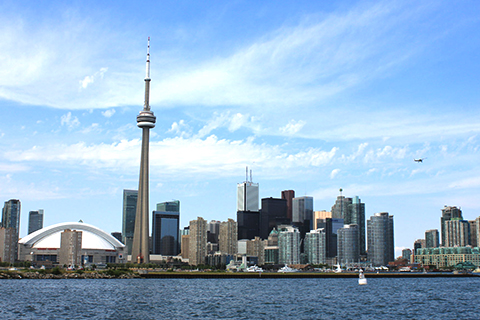We are here to help! Feel free to drop in your query via our form. Our team will reach back to you shortly
Canada
Overview
Canada is the world’s second-largest country, a modern entity burrowed around spectacular scenery, very promising for a healthy outdoor lifestyle. As it was colonized in the 15th century by both the British and the French, Canada is officially bilingual today; French is spoken by almost a quarter of Canadian citizens, mostly around the francophone region of Quebec.
As the country which possesses the highest per capita immigration rate in the world, Canada most definitely makes its expats feel at home and welcomed.
In Canada, each province is bound to create space for international students of the post-secondary level of studies within every legit learning institution be it Universities, Colleges, Private career and Vocational Schools, including Language Schools as well. It is in fact, the quality of life and great chances to true and valued tertiary education what makes Canada a primary choice among international students willing to try their share of a study abroad experience.
[tabby title="Benefits"]
Benefits of study in Canada
The education quality in Canada is one of the major factors in attracting foreign students to their shores. Canada’s high academic standards and rigorous quality controls reflect the high-quality education provided which helps in successful future and benefits one’s career in the long term. Some other advantages of studying in Canada are as follows:
Long Term Advantage: There are major long term benefits to studying in Canada as one would get points for permanent residency in Canada if they have graduated from a Canadian University.
Multicultural Society: The international student advisors at universities help students to get in touch with numerous ethnic clubs and associations along with their study. Canadians are also known for their friendliness and polite nature.
Pioneering and Abundant Research Opportunities: In Canada, both government and industry support research which includes all areas of telecommunications, medicine, agriculture, computer technology, and environmental science.
Possibility of Immigration: Another major attraction for students is the possibility of immigration. After studies, people with Canadian credentials and Canadian work experience may apply for permanent residency without leaving Canada.
Affordable Education: The unique advantage Canada enjoys is that while it is western developed world, it offers education at comparatively less cost than its other western counterparts. Though the education costs may vary based on the courses, for most of the general courses, the tuition fees is less than other major countries. Paying the fees doesn’t become a burden for students.
Internationally Recognized: A Canadian degree, diploma or certificate is globally recognized as being equivalent to those obtained from the United States or Commonwealth countries. University of Toronto, University of British Columbia, McGill University, University of Waterloo all feature in top 50 engineering and technology institutes in the world.
[tabby title="Admission Process"]
Admission & Visa Process
The majority of international students need a permit to study in Canada. To be eligible you must meet the following criteria:
- You must have been accepted onto a course in Canada
- You must be able to prove you have enough money to pay:
- tuition fees
- living expenses
- return transport
- You must not have a criminal record
- You must pass a medical examination (if required)
- You must leave Canada at the end of your authorized stay
Required Documents for admission
- All Academic transcripts and degrees
- Copy of passport/visa (if available)
- Bank statement (some universities may require at t0he time of admission)
- Certificate of English proficiency (IELTS/TOEFL)
- Personal Statement
- 2 Recommendation letters
- Experience letter (all previous work experiences)
- V (it must include all details of work and education)
- Research proposal (for PhD and Research students only)
- Portfolio (for Art and Architecture students only)
Visa Process
ASCOM counsellors will help you in making your visa application. Processing times vary, and the visa office may decide that an interview is necessary. If this is the case, the Canadian visa office will contact you with details of the time and place. Please allow 4-5 months before class start date to lodge an application for visa. Visa process for Canada takes 8-12 weeks at least.
If your application is approved, you’ll be sent a letter of introduction, which you’ll require when entering Canada, so make sure you keep it in a safe place. You may also get a temporary resident visa (TRV), if you are from a designated country. If you’re unsuccessful with your application, you will receive a letter from the visa office explaining why your application was refused. An application could be refused for several reasons, you can contact the visa office if you have any questions.
Documents you need when you arrive
When you arrive in Canada, you’ll be met by somebody from the Canada Border Services Agency (CBSA). You’ll need the following documents:
- a valid passport
- a letter of introduction from the visa office (this includes your permit reference number which the CBSA officer needs to issue your Canadian study permit)
- a letter of acceptance from the school where you will be studying
- proof that you have enough money to support yourself whilst studying
- any documents the visa office recommended when you applied
- a temporary resident visa (if required)
[tabby title="Institutes"]
Universities & Colleges
Canada has a well-established position among the world’s leading study destinations; as of 2014, it was the seventh most popular country for international students, who accounted for 8% of all post-secondary students in the country. The most popular Canadian provinces for international students are Ontario, British Columbia and Quebec, which between them are home to many of the top universities in Canada.
For those looking to study at an elite university in one of the world’s most developed nations, applying to study in Canada can be an attractive option. A total of 26 universities in Canada feature in the QS World University Rankings 2015/16, of which three are in the world’s top 50, with 10 more making the world’s top 300 – a feat matched only by a handful of other nations.
The two highest Canadian entries are McGill University (24th) and the University of Toronto (34th), located in Montréal and Toronto respectively, the two largest cities in Canada. Also ranked within the global top 300 are the University of British Columbia, the University of Alberta, University De Montréal, McMaster University, the University of Waterloo, Western University, the University of Calgary, and Queen’s University
Undergraduate & Postgraduate programme
- Information Technology
- Engineering
- Arts
- Law
- Education
- International Business
- Business Management
- Business and Entrepreneurship
Employment Opportunities during and after Studies
International students who study a full-time undergraduate or postgraduate degree course at a recognized university are allowed to work part-time during term for up to 20 hours a week and full-time during the holidays.
Staying on after study
The Post-Graduation Work Permit Programme e allows graduates who have been studying in Canada for more than eight months to stay on to work after graduation.
[tabby title="How to Apply"]
How to Apply
Applications for Canadian universities are accepted 6-8 months before the class start dates. ASCOM counselors will help you in arranging your admission letter, arranging acceptance letter from university, interview preparation for both admission and visa application.
Whether you plan to pursue a short-term or full degree programme in the Canada, you have to consider the following 'Five Steps to Canada Study'.
Step 1: Research Your Options
ASCOM helps in finding the programme options available and how to identify an institution that best fits your needs.
Step 2: Finance your Studies
You would need to fund your studies and the tuition cost depends on the university you will select.
Step 3: Complete Your Application
ASCOM counsellors will help you in course selection, documents arrangement and providing complete information of requirements to apply for your programme. We arrange your admission letter and acceptance letter from the university.
Step 4: Apply for Your Student Visa
ASCOM expert counsellors will help you making the visa application. Giving updated information on its requirements. You will be prepared for the interview, both for admission and visa, professionally.
Step 5: Prepare for Your Departure
Pre-departure information including gathering documents for arrival and immigration compliance are provided before you depart for your studies.
Academic Year
The University's academic year is divided into three semesters for Undergraduate and Graduate programme. Fall semester (September - December), spring semester (January - May), and summer semester (May - July)
[tabbyending]





